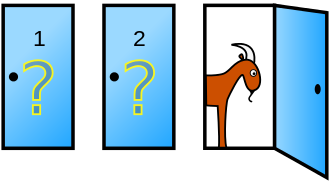Example: Monty Hall Problem

This problem is inspired by the game show Let’s Make A Deal. (It is similar to the Three Prisoners Problem described in the book)
- Three doors, behind one is a prize, behind the other doors there are goats (or some other worthless prize)
- Contestant picks a door. He has a 1/3 chance of picking the door with the prize.
- Monty then opens one of the other doors, always revealing a goat. Do you switch?
People tend to not switch, thinking that they now have a 50-50 shot at it. But on the other hand, you had 1/3 chance of getting the right one at the beginning, why would that change? So you should switch right?
Let’s model this! Let \(D_1\), \(D_2\) and \(D_3\) be the events that the prize is behind door 1, 2, and 3. We assume the prize is randomly assigned, so \(\mathbb{P}[D_1]=\mathbb{P}[D_3]=\mathbb{P}[D_3]=1/3\). Let us call the events of Monty Hall opening each door: \(M_1\), \(M_2\), and \(M_3\). Assume we pick door number 1, and Monty opens door 3 revealing a goat. Now conditioned on the prize location we can compute the (apriori) probability of Monty opening door 3:
\[ \mathbb{P}[M_3 \mid D_1] = 1/2 \text{, } \mathbb{P}[M_3 \mid D_2] = 1,\text{ and } \mathbb{P}[M_3 \mid D_3] = 0 \] Now use Bayes’ rule to compute \(\mathbb{P}[D_1|M_3]\): \[ \mathbb{P}[D_1|M_3] = \frac{\mathbb{P}[M_3 \mid D_1]\mathbb{P}[D_1]}{\mathbb{P}[M_3 \mid D_1]\mathbb{P}[D_1] + \mathbb{P}[M_3 \mid D_2]\mathbb{P}[D_2] + \mathbb{P}[M_3 \mid D_3]\mathbb{P}[D_3]}\\ = \frac{1/2*1/3}{1/2*1/3+1/3+0}= 1/3 \]
Note that \(\mathbb{P}[D_1|M_3] = \mathbb{P}[D_1]\) and is independent of the door opening. So you should switch! Surprisingly, in a Mythbusters episode 20 out of 20 volunteers decided not to switch!
If you ever have to explain this to someone, have them think about the case with 100 doors, and after you pick a door, Monty opens up 98 goat doors. Seems pretty obvious you should switch at that point!